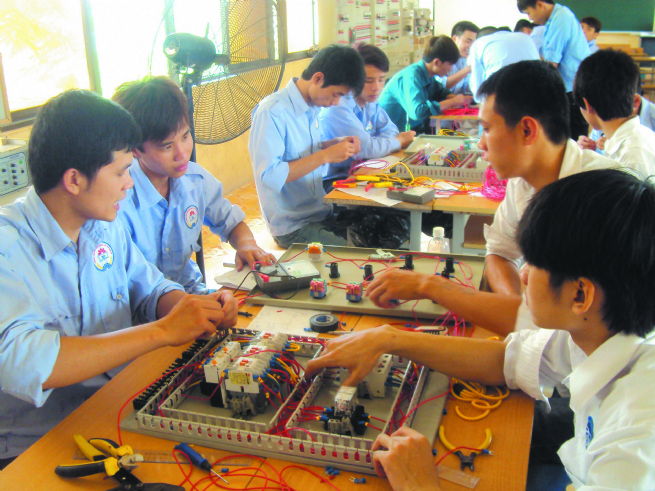Determining that the quality of human resources is an important factor in economic development and investment attraction, the Department of Labor, Invalids and Social Affairs of Hai Phong City has promoted vocational education programs, aligned training with social needs, and increased the rate of trained workers. Mr. Nguyen Cao Lan, Director of the department, grants an exclusive interview to our reporters on this issue.
What are your perspectives on the development of vocational schools in Hai Phong City today? What solutions does the education and training sector adopt to improve the quality of vocational education to meet increasing social demands?
By the end of March 2024, Hai Phong City was home to 40 vocational schools (including 17 colleges, nine intermediate schools and 14 vocational education centers) and 25 units with vocational education (including 14 district vocational and continuing education centers and 11 companies with registered vocational education activities).

As an authority of vocational education, labor and employment, the Hai Phong Department of Labor, Invalids and Social Affairs has focused on effectively implementing many measures to promote and innovate vocational education in a more systematic, professional and flexible manner to meet increasing labor requirements, especially in key economic sectors and fields.
Accordingly, vocational education facilities focus on investing in a synchronous direction, ensuring the quality of infrastructure, training equipment, teachers, ensuring the quality of vocational training in line with corresponding requirements of the country, ASEAN and international key trades like nursing and pharmacy at Hai Phong Medical College, and industrial electricity and mechanical engineering at Hai Phong Technical College.
In particular, vocational schools have persistently innovated training goals to meet specific demands, and diversified communication methods, counselling and enrollment. The quality and effect of vocational training has made positive progress and vocational skills of graduated trainees have been improved. 80-85% of workers trained at the college level are employed to work in the occupations they are taught at school and 30% have good or better vocational skills. In some occupations like welding, restaurant service and ship steering, trainees’ vocational skills have met international standards.
As a result, vocational schools have initially satisfied the requirements for highly skilled human resources from tenants in industrial parks and FDI companies and for export. Vocationally trained workers work in most fields and can take on complicated work positions that previously had to be performed by foreign experts. Over 85% of students and apprentices are employed immediately after graduation. In some occupations, this rate is 100%.
What is your assessment of vocational training associated with job creation and the participation of businesses in the training and recruitment process?
To reinforce the cooperation between vocational schools and businesses in training and employment of graduated trainees, the Department of Labor, Invalids and Social Affairs advised the Hai Phong People's Committee to launch Plan 221/KH-UBND dated October 9, 2018 on accelerated cooperation between vocational schools and companies in the 2018 - 2030 period. To date, 25 out of 39 vocational facilities have separate divisions to perform school - business cooperation, accounting for 64%.
In addition, currently most colleges and intermediate schools in the city have linked, cooperated and coordinated with businesses in vocational education and training in many forms. For example, businesses take part in building and developing training programs and training textbooks, and accept students for internships and support schools to improve facilities, training equipment and practice workshops. Many colleges and intermediate schools have actively coordinated with businesses to develop, compile, assess and promulgate training programs with various forms such as annualized training and credit-based training.
Hence, this approach has helped reform and improve the quality of vocational schools, shift from capacity-based training to demand-based training based on the needs of tenants in economic zones, industrial parks, industrial complexes and local investment projects.
However, besides some popular and high-demand occupations (like textile and garment manufacturing, assembling and processing), schools find it hard to recruit students for some fields and occupations, especially heavy and hazardous industries and occupations like welding, metal cutting and ship hull manufacturing. Vocational education cooperation remains limited. Training quality still does not meet market needs.
To further raise the "Labor Training" component index in the Provincial Competitiveness Index (PCI) and accompany and support businesses and investors in the coming time, what solutions will the education and training sector of Hai Phong City implement?
The sector is focusing on some specific solutions as follows:
Further reforming communications on vocational education and effectively streamlining vocational education courses as per Plan No. 126/KH-UBND of the Hai Phong People’s Committee to carry out the “Vocational training and career streaming in universal education in the 2018 - 2025 period” project in the city; effectively enforcing the resolution of the Standing Board of the Municipal Party Committee on vocational education quality reform and improvement in Hai Phong City to 2030, with a vision to 2045.
Directing and guiding local vocational schools to strengthen vocational training and enrollment, enhancing training quality; promoting accreditation and self-accreditation of the quality of vocational schools; intensifying enforcement inspection and examination of vocational education laws.
In addition, reviewing, advising and proposing continued simplification of regulations and administrative procedures on vocational education to facilitate businesses, organizations and individuals to take part in vocational education.
Thank you so much!
Bao Ngoc (Vietnam Business Forum)